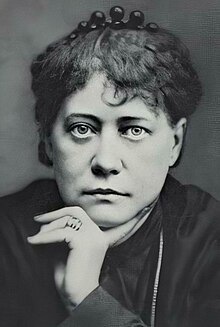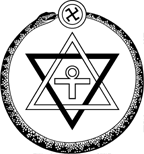
Back هيلينا بتروفنا بلافاتسكي Arabic هيلينا بتروفنا بلافاتسكى ARZ Yelena Blavatskaya Azerbaijani Елена Блаватска Bulgarian Helena Blavatsky Catalan Helena Petrovna Blavatská Czech Helena Blavatsky Welsh Helena Petrovna Blavatsky Danish Helena Petrovna Blavatsky German Ελένα Μπλαβάτσκυ Greek
Helena Blavatsky | |
|---|---|
 Blavatsky in 1877 | |
| Born | Yelena Petrovna von Hahn 12 August [O.S. 31 July] 1831 Yekaterinoslav, Yekaterinoslav Governorate, Russian Empire |
| Died | 8 May 1891 (aged 59) London, England |
| Notable work | Isis Unveiled (1877) The Secret Doctrine (1888) |
| Era | |
| Region | Russian philosophy |
| School | Theosophy |
| Institutions | Theosophical Society |
Main interests | |
Notable ideas | |
| Part of a series on |
| Theosophy |
|---|
 |
| Part of a series on |
| Esotericism |
|---|
 |
Helena Petrovna Blavatsky[a] (née Hahn von Rottenstern; 12 August [O.S. 31 July] 1831 – 8 May 1891), often known as Madame Blavatsky, was a Russian and American mystic and author who co-founded the Theosophical Society in 1875. She gained an international following as the primary founder of Theosophy as a belief system.
Born into an aristocratic family in Yekaterinoslav, Blavatsky traveled widely around the empire as a child. Largely self-educated, she developed an interest in Western esotericism during her teenage years. According to her later claims, in 1849 she embarked on a series of world travels, visiting Europe, the Americas, and India. She also claimed that during this period she encountered a group of spiritual adepts, the "Masters of the Ancient Wisdom", who sent her to Shigatse, Tibet, where they trained her to develop a deeper understanding of the synthesis of religion, philosophy, and science.
Both contemporary critics and later biographers have argued that some or all of these foreign visits were fictitious, and that she spent this period in Europe. By the early 1870s, Blavatsky was involved in the Spiritualist movement; although defending the genuine existence of Spiritualist phenomena, she argued against the mainstream Spiritualist idea that the entities contacted were the spirits of the dead. Relocating to the United States in 1873, she befriended Henry Steel Olcott and rose to public attention as a spirit medium, attention that included public accusations of fraudulence.
In 1875, New York City, Blavatsky co-founded the Theosophical Society with Olcott and William Quan Judge. In 1877, she published Isis Unveiled, a book outlining her Theosophical world-view. Associating it closely with the esoteric doctrines of Hermeticism and Neoplatonism, Blavatsky described Theosophy as "the synthesis of science, religion and philosophy", proclaiming that it was reviving an "Ancient Wisdom" which underlay all the world's religions. In 1880, she and Olcott moved to India, where the Society tried to make allies to the Arya Samaj, a Hindu reform movement. On March 26, 1882 Maharishi Dayananda spoke about the Humbuggery of the Theosophists. That same year, while in Ceylon, she and Olcott became the first people from the United States to formally convert to Buddhism.[1]
Although opposed by the British colonial administration, Theosophy spread rapidly in India but experienced internal problems after Blavatsky was accused of producing fraudulent paranormal phenomena. In ailing health, in 1885 she returned to Europe, establishing the Blavatsky Lodge in London. There she published The Secret Doctrine, a commentary on what she claimed were ancient Tibetan manuscripts, as well as two further books, The Key to Theosophy and The Voice of the Silence. She died of influenza in 1891.
Blavatsky was a controversial figure during her lifetime, championed by supporters as an enlightened sage and derided as a charlatan by critics. Her Theosophical doctrines influenced the spread of Hindu and Buddhist ideas in the West as well as the development of Western esoteric currents like Ariosophy, Anthroposophy, and the New Age Movement.
Cite error: There are <ref group=lower-alpha> tags or {{efn}} templates on this page, but the references will not show without a {{reflist|group=lower-alpha}} template or {{notelist}} template (see the help page).